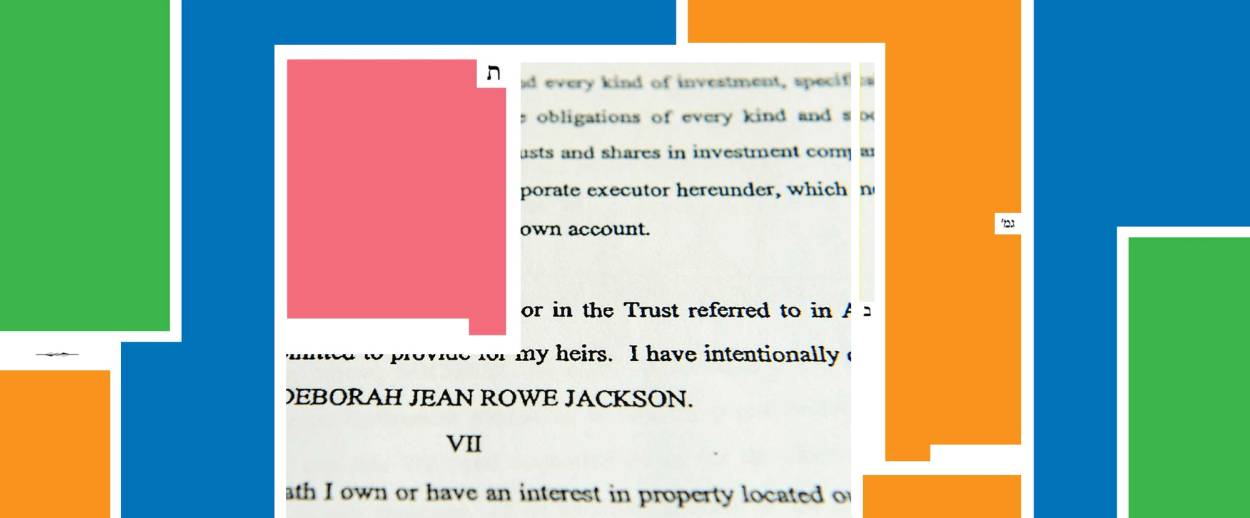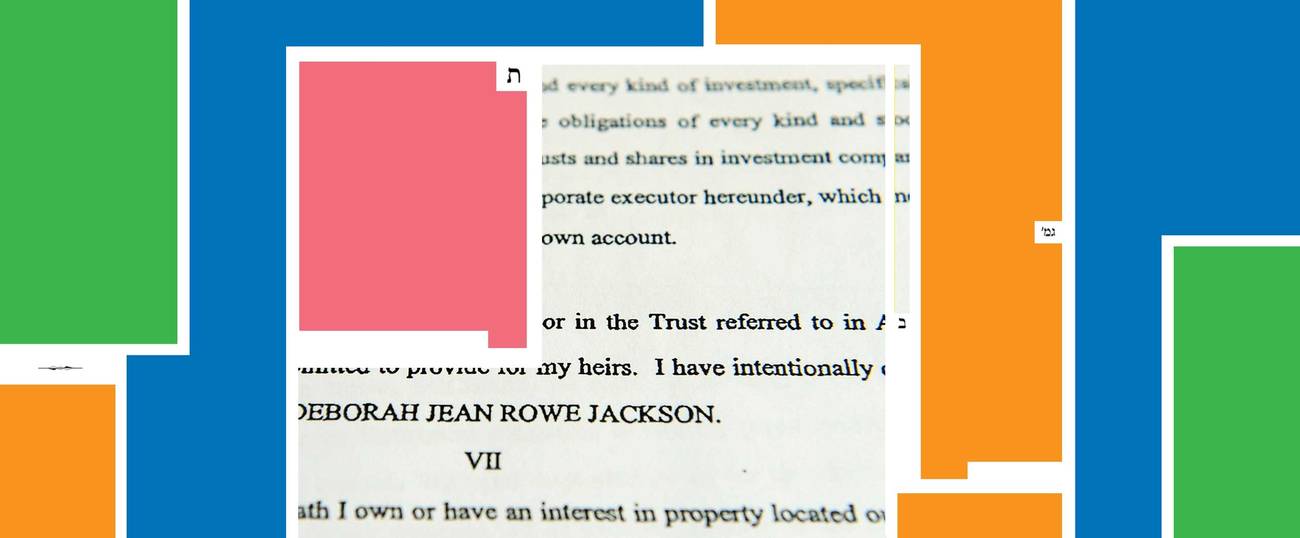The Inheritance
In this week’s ‘Daf Yomi,’ one sage overrules the consensus, and men may dispose of their wealth upon their deathbeds at will




Literary critic Adam Kirsch is reading a page of Talmud a day, along with Jews around the world.
In the two weeks since my last column, Daf Yomi readers have continued to explore the laws of inheritance in Tractate Bava Batra. Earlier, we saw that the Torah established a fixed order for inheritance: a deceased man’s sons inherit his property, with the first-born son taking a double share; if he has no sons, his daughters inherit; if there are no daughters, his brothers inherit; and so on. However, as interpreted by the rabbis, this order turns out to be more flexible than it might appear; a dead man’s father, they rule, actually inherits before his brothers.
This week, the Talmud considered another aspect of the question of inheritance. Can a man bequeath his property in a way inconsistent with the Torah’s rules? For instance, can he disinherit one of his sons, or deprive the first-born of his double share? Really this is a question about the meaning of ownership in Jewish law, which is simultaneously a civil code and a religious one. Does a Jew’s property belong to him absolutely, so that he can dispose of it however he likes? Or does it belong to him, as it were, on sufferance from God, so that God’s commandments limit how he can use it?
In such matters, the Talmud has previously stated as a general rule that “a stipulation counter to that which is written in the Torah” is null and void. This rule came up in Tractate Kiddushin in connection with the Torah obligation of a husband to provide food and clothing for his wife. Could a wedding contract cancel this obligation, provided that both husband and wife agreed to it? As we are reminded in the Gemara this week, in Bava Batra 126b, the answer is no: “She is betrothed and the stipulation is void,” according to Rabbi Meir.
By the same logic, one might think that a man cannot bequeath his property in a way contrary to the Torah’s rules. And indeed, that is the judgment of the rabbis, whose consensus determines the law. According to the Mishna, “One who says: So-and-so, my firstborn son, will not take a double portion, or one who says: So-and-so, my son, will not inherit among his brothers, he has said nothing, as he has stipulated counter to that which is written in the Torah.”
However, it quickly becomes clear that this is not the rabbis’ final word on the matter. As often happens in the Talmud, particularly when property is at stake, the rabbis look for legal methods to achieve a greater flexibility than the Torah’s plain meaning seems to allow. For instance, we read in Tractate Gittin about how the great sage Hillel invented the prosbul, a legal instrument that circumvented the Torah law that forgives all debts in the Sabbatical year. The prosbul was invented for the sake of tikkun olam, the perfection or betterment of the world—not in the abstract, spiritual, or social-justice sense in which that phrase is often used today, but in a concrete financial sense. By making it easier for Jews to collect debts, it ensured that the supply of capital wouldn’t dry up as the sabbatical year approached.
When it comes to inheritance, too, the rabbis find a way to make the law more flexible. It is true, they say, that a man cannot bequeath his property however he sees fit; he can give it to whichever of his heirs he prefers. The difference seems to be purely verbal: If you use the word “inherit,” your instruction is null and void, but if you use the word “give,” it is valid. Indeed, even if the testator uses both words, he is considered to be making a gift, as the Gemara explains in Bava Batra 129b. Formulations like “Such and such a field will be given to so and so and he will inherit it,” or “he will inherit it and it will be given to him,” qualify as gifts even though they also refer to inheritance.
This seems to rewrite the laws of inheritance in a very permissive way. So long as the transfer of property is made before the testator’s death—even if he is on his deathbed—he can violate the order of inheritance that the Torah lays down. But the following Mishna, in Bava Batra 130a, makes the law still freer, thanks to the opinion of Rabbi Yochanan ben Beroka. In this Sage’s view, even if the dying man uses the language of inheritance, he is free to leave his property to whomever he prefers, provided that “he said this about one fit to inherit from him.”
The Gemara puzzles over what is meant by this: Who is “one fit to inherit from him”? One might think it means any relative who belongs to any valid category of heirs—sons, daughters, brothers, or more distant relations. On this reading, a man could not will his property to a total stranger, but he could will it to a daughter in preference to his sons—even though, according to the Torah, daughters can inherit only in the absence of sons. But according to Yochanan ben Beroka’s own son, Rabbi Yishmael—who ought to have known, if anyone did—this was not his father’s intention. Rather, the rule means the testator can choose any member of an eligible class of heirs to inherit all his property. Thus, if a man had surviving sons, he could not leave his property to a daughter, because she would not be “fit to inherit from him” under those conditions. However, he could leave all his property to any one of his sons he chose.
This is one of the rare occasions in the Talmud when the ruling of a single sage determines the law, rather than the consensus of the rabbis. Indeed, both Rav and Shmuel—famous Talmudic antagonists, who generally disagree—hold that in this case “the law is in accordance with Rabbi Yochanan ben Beroka.” To justify this apparent departure from Torah law, however, they find a kind of basis in the Torah’s own text. The passage in Deuteronomy that lays down the laws of inheritance includes the phrase, “Then it shall be, in the day that he causes his sons to inherit.” According to Rava, this implies that the father has permission to bequeath his property to any of sons he chooses, because he is the “cause” of their inheriting in the first place. If this seems to contradict a plainer statement of the Torah elsewhere, so be it; as we have seen, the rabbis are happy to interpret the Torah freely, even counterintuitively, when it helps them to reach the legal conclusions they find necessary.
***
Adam Kirsch embarked on the Daf Yomi cycle of daily Talmud study in August 2012. To catch up on the complete archive, click here.
Adam Kirsch is a poet and literary critic, whose books include The People and the Books: 18 Classics of Jewish Literature.